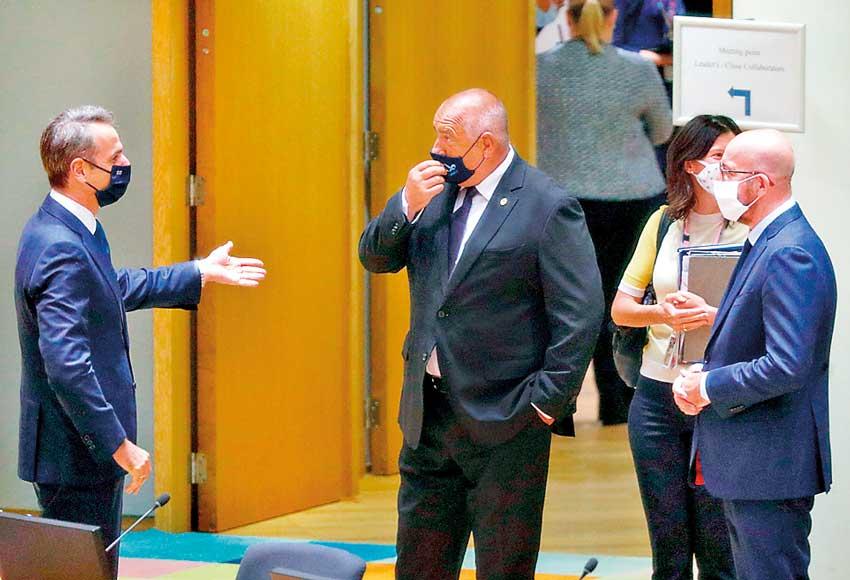18 Jul 2020 - {{hitsCtrl.values.hits}}

From left: Greece’s Prime Minister Kyriakos Mitsotakis, Bulgarian Prime Minister Boyko Borisov and European Council President Charles Michel gesture at the start of the summit in European Council headquarters in Brussels
BRUSSELS (AFP) - The leaders of the European Union held their first face-to-face summit in five months yesterday, but the reunion seems unlikely to bridge their divide over a post-virus economic
rescue plan.
Germany’s Chancellor Angela Merkel turned 66 on the day she and her 26 colleagues returned to Brussels, not to celebrate but to see whether in-person negotiations can answer a
750-billion-euro question.
Arriving at the European Council, where the leaders will meet with reduced teams and observe social distancing, France’s President Emmanuel Macron described it as a “moment of truth”. “We are going through an unprecedented crisis, on the health but also the social level. We need much more solidarity and ambition,” he said. Merkel and Macron are backing a recovery package made up of a mixture of loans and grants to member states to revive economies shattered by the virus and preventive lockdowns.
“It’s our European project which is in play here,” he said, before meeting the Netherlands’ Prime Minister Mark Rutte - who is holding out against doling out cash without tough conditions. “Solidarity, yes, from countries that can now free up more in their own budgets to fight the crisis, towards countries that can do less,” Rutte said.
“But at the same time, you can also ask those countries to do everything possible to solve this yourselves the next time. And you do this through reforms, in the labour market, in pensions etc.”
The EU has been plunged into a historic economic crunch by the coronavirus crisis, and EU officials have drawn up plans for a huge stimulus package to lead their countries out of lockdown.
But a determined band of northern capitals, led by the Netherlands, is holding out against handing cash to their southern neighbours without their commitment to reform. Friday’s talks are expected to run into Saturday and perhaps even Sunday, but few here are confident of a breakthrough, despite the tight timetable, so another summit may well follow later this month.
“I think we have very hard and difficult two days today and tomorrow,” said Estonian Prime Minister Juri Ratas. Rutte put the chance of success this weekend at less than 50 percent.
Summit host Charles Michel, the president of the European Council, has tried to create a sense of momentum after previous coronavirus-era videoconferences served only to underline the leaders’ differences.
eavily-indebted countries like Spain and Italy carry out reforms, under European
Commission oversight.
This is furiously opposed by the south. Both Michel and Merkel, whose country has just taken on the rolling six-month presidency of the EU, will struggle to broker any compromise.
The Netherlands has emerged as the most likely hold out, but Rutte’s position is backed to varying degrees by fellow members of the so-called “Frugal Four” -- Sweden, Denmark and Austria.
Michel’s draft plan foresees a recovery package, made up of 250 billion in loans and 500 billion in grants and subsidies that would not have to be repaid by the recipient
member states.
The Frugals oppose grants, and want any loans to come with conditions attached.
This package is in addition to the planned 1,074-billion-euro seven-year EU budget from 2021 to 2027 that the leaders must also agree in the coming weeks or months.
Aside from the governance of the recovery package, the leaders may also clash over efforts to make EU budget support contingent on member states respecting the rule of law.
Hungary and Poland, which have been targeted by the European Commission over their alleged drift into authoritarianism, will fight to stop such a rule being written into
the budget.
17 Nov 2024 17 Nov 2024
17 Nov 2024 17 Nov 2024
17 Nov 2024 17 Nov 2024
17 Nov 2024 17 Nov 2024
17 Nov 2024 17 Nov 2024